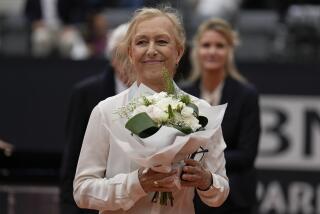Hingis retires after positive cocaine test
- Share via
The storied tennis career of Martina Hingis, winner of five Grand Slam singles titles, came to a stunning conclusion Thursday with two revelations: she tested positive for cocaine at Wimbledon this year and would retire, effective immediately.
“I find this accusation so horrendous, so monstrous that I have decided to confront it head-on by talking to the press,” Hingis said at an emotional news conference in Zurich, Switzerland. “ . . . I believe that I am absolutely, 100% innocent.”
Her blockbuster announcement left the tennis world reeling and raised questions about the drug-testing process. She plans to aggressively mount a defense, according to tour officials.
Hingis, 27, didn’t learn until mid-September that the first urine test, the A sample, came back positive. Several weeks later she learned that the second one, the B sample, also was positive.
Her prepared statement ended with five words: “I have never taken drugs.” She took no questions from reporters.
Her decision to go public is not unprecedented but is unusual. She didn’t have to reveal anything because her case had yet to make its way to an International Tennis Federation (ITF) tribunal, and a public announcement comes only if a player is found guilty of a doping offense. It is usually then that players have mounted a spirited defense, not beforehand.
WTA Tour chief executive Larry Scott found out a few weeks ago when Hingis asked her agent at Octagon to bring him into the loop after the B sample came back positive.
“We’re not officially notified until there is a finding,” he said in a phone interview from Florida on Thursday night. “There’s no doping offense yet. . . . All indications are that she’s planning on fighting it aggressively and trying to clear her name.”
Hingis, who leaves the game ranked 19th, said she would be terrified of taking drugs and told reporters that after learning of the A sample, she had her hair tested, which could prove if someone had taken cocaine. That test, she said, produced a negative result.
But Dr. Gary Wadler, associate professor of clinical medicine at New York University and a member of the World Anti-Doping Agency, said there are limitations to the hair test, that it addresses long-term drug usage.
“It’s a snapshot over time as opposed to a point in time,” he said in a phone interview.
Dr. David Black, founder and chief executive officer of the Nashville-based Aegis Sciences, the largest independent doping lab in the country, concurred. “A single use of cocaine would not necessarily show up in a hair test,” said Black, a forensic toxicologist.
Said Hingis: “They say that cocaine increases self-confidence and creates a type of euphoria. I don’t know. I only know if I were to try to hit the ball while in any state of euphoria, it simply wouldn’t work. I would think it would be impossible for anyone to maintain the coordination required to play top-class tennis while under the influence of drugs.”
Thus, her second comeback, which had started so promisingly in early 2006, ended in an abrupt, murky and, ultimately, sad way.
Hingis first quit in 2002 because of a series of foot and leg injuries, but in her first tournament back made the semifinals and then made the final eight of the Australian Open and the French Open, losing to Kim Clijsters both times.
But then came more injuries. She almost seemed like a relic of bygone days before sheer power trumped her vaunted guile and innate court sense
This year, she played only two matches following the U.S. Open, winning one. She lost in the third round of her last two Grand Slams, the U.S. Open and Wimbledon.
Ten years ago, Hingis came within one match of winning all four Grand Slams, falling short in the French Open final, which remained the only major to elude her.
“She’s meant an enormous amount to women’s tennis, accomplished quite a few firsts, and she’s one of the most popular players in the world,” Scott said. “At her last tournament in Beijing, I was blown away by her level of popularity.”
He used the word Beatles-esque.
Scott also said he felt a sense of “sadness and regret for the sport that she’s announcing her retirement under this cloud.”
“She deserves better, considering all she’s meant and all she’s accomplished,” he said, noting the presumption of innocence. “That’s a human reaction.”
More to Read
Go beyond the scoreboard
Get the latest on L.A.'s teams in the daily Sports Report newsletter.
You may occasionally receive promotional content from the Los Angeles Times.











